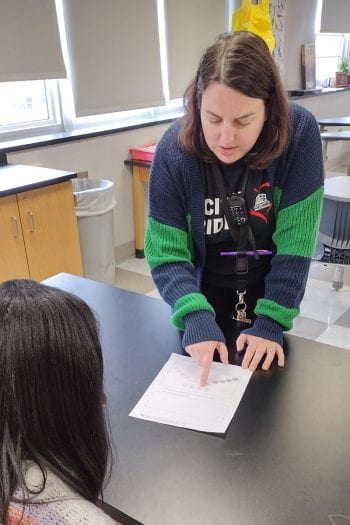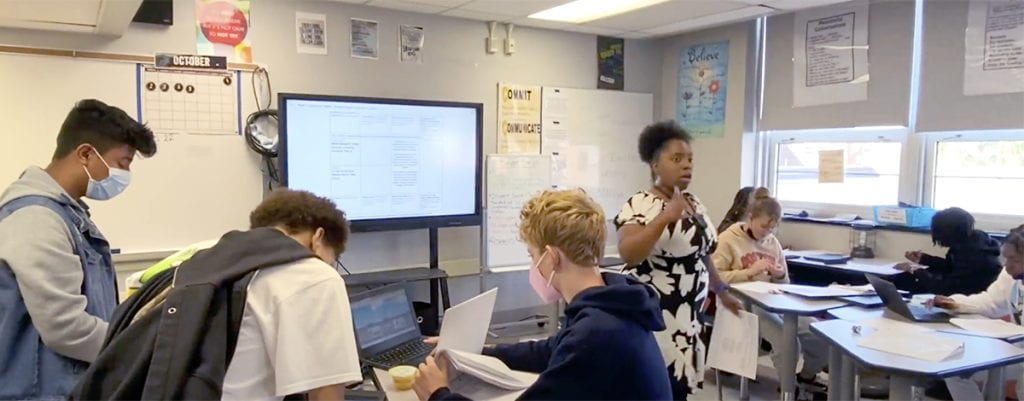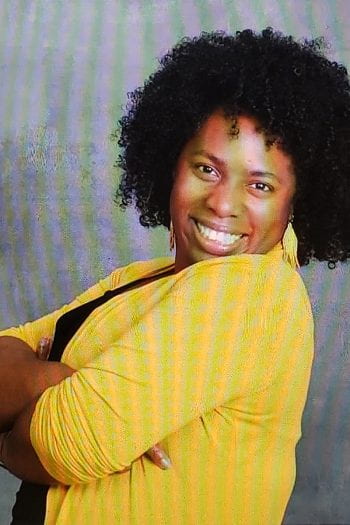When approached with the opportunity to watch videos of herself guiding a classroom of eighth graders through a science lesson, Jennifer Steimel was less than enthusiastic.
“I totally dreaded it at first,” admits Steimel, who joined the staff at Brittany Woods Middle School (BWMS) in University City in Fall 2022 armed with nine years of teaching experience. She’s found herself in good company with five other science teachers in her building who are taking a closer look at themselves and one another by participating in Sci314, an embedded coaching pilot with the Institute for School Partnership at Washington University in St. Louis (ISP).

As it turns out, the experience hasn’t been all that bad. In fact, with one coaching cycle under her belt, she’s looking forward to the next one.
“My fellow teachers have been really supportive and positive,” Steimel says. “The thing that surprised me about it was how affirmed I felt at every step of the process. There were no ‘gotcha’ moments.”
The missing “gotcha’s” never materialize for one simple reason: that wouldn’t be in keeping with ISP’s approach to partnership. Instructional specialists do a lot more listening than talking, take teacher/educator insights seriously and invite partners to determine what they want and need.
Elizabeth Gardner, coordinator of district-wide professional development and secondary science curriculum at the School District of University City is a former middle school science teacher herself and very familiar with ISP’s signature mySci program, a comprehensive curriculum designed to engage students in authentic science learning with hands-on material kits and high-quality professional development support.
“Joining forces with the mySci team to pilot Sci314 was a pretty organic process,” explains Gardner, who knew firsthand just how collaborative the work had been when the District helped develop mySci. “The team would ask for feedback, then actually make modifications and literally show up the next day with the materials and changes we suggested! We’re here with partners. We trust them.”
An added bonus, says Gardner, is the message of autonomy to teachers.
“The teachers pick their goal,” she says. “This is their opportunity to identify what they want to improve. The feedback from teachers so far on the video coaching has been extremely positive.”

Lights, camera, action
When an “expert” comes into a classroom for “observation,” chances of a teacher feeling like they are in the hot seat are high. Adding a camera to the mix has the potential to only heighten the level of anxiety, but Lanesha McPherson, also an eighth grade science teacher, says that’s not a problem at BWMS.

“In our building, having adults come in and out of the classroom is the norm, so this worked well for recording. We could just be ourselves,” says McPherson. “Having Heather and Alex (ISP’s instructional specialists) there, just as part of the room, was easy. The students know why they are there, so it was all very natural.”
Both McPherson and Steimel appreciated the collaborative nature of the process, especially being asked what they wanted to work on. For the first cycle, Steimel chose to focus on how she asked questions to determine students are grasping the concepts.
“There are different ways to ask ‘Do you get it?’ for students who don’t necessarily express themselves with pen and paper,” says Steimel, who noticed something else by watching herself on video. “My voice is very quiet, which worked in my previous setting, but not in my current classroom.”
McPherson’s focus for the first cycle was honing her craft to ask deeper, probing questions.
“They know more than they think they know,” she says. Despite her 18+ years of teaching experience, she welcomes the chance to also remain a learner. “We know our content, but this process helps us learn more about ourselves. We’re always working to do something better. After watching the video, you can see where you are. It really helped.”
Using videos as a reflective tool for teacher professional development is becoming more common, says ISP Instructional Specialist Heather Milo, who together with Alex Gerber, also an instructional specialist, is leading the coaching pilot for Sci314.
“We know that peer teacher observations have significant benefits for supporting teacher learning and teaching practices, but substitute teacher shortages sometimes make these impossible to implement,” says Milo. “Video can provide the same learning benefits without the added strain on a district’s resources. This is an important part of maintaining equitable access to high-quality teacher professional learning.”
“The first year of this pilot was about building trust,” says Milo. “And this year has been a game-changer as teachers feel safe and become more skilled at tuning into the nuance of students’ science ideas and analyzing the why behind their in-the-moment instructional decision-making in their classrooms.”
